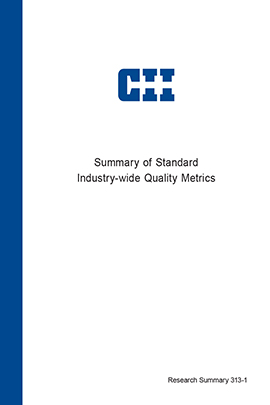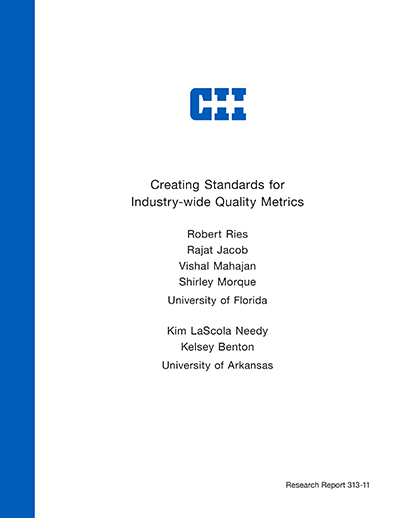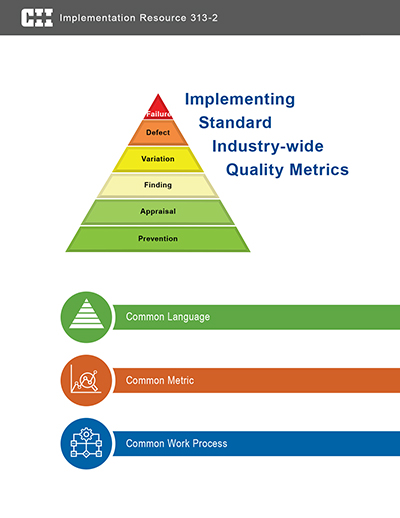
Summary of Standard Industry-wide Quality Metrics
Publication No
RS313-1
Type
Research & Development Product
Publication Date
Mar 01, 2018
Pages
29
Research Team
RT-313
DOCUMENT DETAILS
Abstract
Key Findings
Filters & Tags
Abstract
Key Findings
The common language is documented in the Quality Pyramid, similar to the Safety Pyramid. Definitions of the terms follow the pyramid.
Unplanned Events:
- Failure: Does not meet specifications, not detected until turned over to intended user
- Defect: Does not meet our specifications, must be corrected
- Variation: Does not meet our specifications, one time acceptance
Unplanned Outcomes of Planned Activities:
- Finding: Evidence from Planned Activities that we are not following our practices
Planned Activities:
- Appraisal: Team checks; assessments that we follow our practices
- Prevention: Quality Management Activities, e.g. training.
RT-313 developed the Quality Performance Rate (QPR):
where:
QPR = Quality Performance Rate
Ni = Unplanned quality event i (includes the lagging indicators; variations, defects, and failures)
wi = Weight of severity level for quality event i (see Key Finding #3)
QPR = Quality Performance Rate
Ni = Unplanned quality event i (includes the lagging indicators; variations, defects, and failures)
wi = Weight of severity level for quality event i (see Key Finding #3)
Within each unplanned event, a severity scale can be used to further assess the impact on the project from defects and failures. RT-313 utilized qualitative severity levels of Low (L), Medium (M), and High (H) for defects and failures. The levels are non-quantitative and are established by each organization based on the quality event’s estimated impact on the project safety, cost, and schedule. Note that the team assessed that variations do not require a severity scale, as project impact relative to safety, cost, and/or schedule is always considered to be Low, given the as-identified quality issue is accepted as-is.
Note : % = Impact of Quality Event as a Percent of the Project Total Value.
Severity Weighting Scale (wi):
Variation = 1
Defect – Low Severity = 2
Defect – Medium Severity = 4
Defect – High Severity = 6
Failure – Low Severity = 8
Failure – Medium Severity = 16
Failure – High Severity = 24
RT-313 developed a Common Work Process to help organizations implement a process to establish a QPR for one project or across the organization’s portfolio of projects. The process is a roadmap designed to help the organization’s quality management team to prepare a value improvement presentation to the leadership team. The roadmap provides a grass root (step-by-step) approach for piloting project implementation, accessing the existing quality data within the organization, developing a collection plan, analysis of the data, and ultimately determining whether the QPR should become a standard metric for the organization.
Filters & Tags
Knowledge Area
Project Phase
Project Function
Industry Group
Research Topic
Creating Standards for Industry-wide Quality Metrics
Keywords
Quality Pyramid,
Quality Performance Rate,
Industry-wide Quality Metric,
Quality Metric Data Collection Tool,
Common Quality Metric,
Severity Model,
Unplanned Events,
Unplanned Outcomes of Planned Activities,
Planned Activities,
Prevention,
Appraisal,
Finding,
Variation,
Defect,
Failure,
rt313



